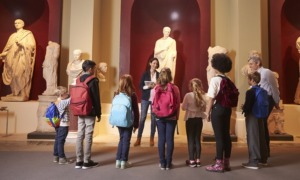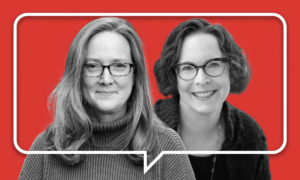When youth minister Russell Wilson returned to the church his father helped to build in southern Indiana, he saw a dwindling number of new parishioners.
Seventy-five miles south, youth minister Gary Spear faced a congregation that consisted mostly of old folks and teens, with few parents bringing whole families into the fold. f
The two men used the same approach to address the problem: opening new youth centers at their nondenominational Christian churches. But their centers take decidedly different approaches in how they relate to youth.
Spear’s center unabashedly promotes faith thr ough activities focusing on religious exploration, with a few card games thrown in. Wilson’s center takes a lighter touch, giving kids opportunities to talk about religion after shooting pool.
As churches continually strive to reach more young people, the approaches of these two youth ministers show the roles that youth centers can play. But creating such centers raises a key question: How much should they push religion?
Whom to Serve?
The answer depends partly on whether the center is designed primarily for kids in a church’s congregation, or as a gathering place for both church-going youth and those who have little interest in religion.
Either can justify the creation of a youth center. “I’ve seen a lot of churches die because they had no youth,” Wilson says. “So when I came back, we decided we were going to focus on bringing more in.”
Wilson says he “came back” because in the 1950s, his father helped build the West Newton Full Gospel Tabernacle, which later became the West Newton Worship and Youth Center. Wilson helped tend to the church as a young man and returned in 1991 after ministering at other local churches in the area.
At first, he focused on youth from families in his congregation. Then the minister, who is also a well-driller, set out to explore for youth who were not involved in his church, or even in any other.
Wilson and youths from the church canvassed nearby neighborhoods with fliers and hosted secular events, such as car shows and trips to amusement parks, to draw interest from kids outside the church. Meanwhile, the church began transforming an old gymnasium that it had rented out for storage into a youth center.
The center, created with $35,000 raised from the 175-member West Newton congregation, opened last year. It has about 80 regular participants, Wilson says.
Down in Mitchell, a rural town of about 5,000 between Indianapolis and Louisville, Ky., Spear inherited his congregation at the Mitchell Church of Christ in 2001. With it came about 325 members and a 12-member youth group that met in the church basement.
For his youth center, Spear put an addition on a family center that the church built four years ago. Thanks to $250,000 raised by church families and friends, the youth center opened in March. It includes a classroom and technology section that features four computers with high-speed DSL lines.
Most of the 100 seventh- to 12th-graders who attend various parts of the center’s youth program, called Faith Quest, belong to Mitchell Church or other local churches, Spear says. But he and an assistant regularly head out to an old gate near the town’s high school, where youth in various “subcultures” congregate to smoke and hang out.
“We set up some comfortable chairs and handed out 100 free Cokes and snacks,” Spear says of the first foray. “We freaked them out, I think, so they didn’t come straight over. But eventually, they see that we’re about more than what they associate with religion.”
He says the center has recruited about 10 percent of its members through this self-dubbed “gate ministry.”
What to Do?
Wilson’s center in West Newton is designed as a magnet for youth, whether they want religion or not. On one side is a game room with pool and ping-pong tables. On the other is space for basketball, dodge ball and soccer. In the basement is a sanctuary for youth church services.
The only rules: no cursing, drinking or smoking.
Wilson has no qualms about saying the mission is twofold. “It’s an attempt to help youth in the area and to help our church grow.”
But, he says, “We don’t let them come and just hang out.” Most of the programming involves sports, games and Scripture. The groups take some low-cost trips, to Paramount’s Kings Island amusement park in Ohio or the Hoosier Horse Show, for example, or exploring caves in southern Indiana.
“We combine religion and play and show them you can be a Christian and still have fun,” Wilson says. “We tell them, ‘Lookey here: You’re gonna get to play for an hour, and you’re gonna spend 20 to 30 minutes in a group talking about problems, religion.”
The center has a volunteer sports coordinator, and a husband-and-wife volunteer team is assigned to work with each of four age groups.
The group meetings often start with a prayer, followed by a Bible reading by one of the leaders. From there, the discussion stays on Christianity or drifts to what’s going on in kids’ lives. Volunteers are encouraged to engage youths in one-on-one counseling from time to time.
The center is usually open two to four times a week. Wilson estimates that one night of operation costs between $40 and $60, mostly for food.
Spear’s approach to youth work couldn’t be more different.
“Our philosophy is that there are no activities just for the fun of it,” he says. “Anything we do that takes resources, we try to make it have a pretty specific spiritual correlation. If they want to go to King’s Island, they can do that themselves or with anyone they want.”
Spear, who operates the youth programs on about $5,000 a year, starts each week with two Sunday Bible discussions, where youth apply biblical writings to current events. The sessions are nearly college-level: One was on the art of worship, examining how Israelites worshipped in ancient times and what teens can do to instill in themselves the Israelites’ better qualities.
The theology continues on Wednesday nights, as youth gather to develop projects related to the “postmodern climate of Christianity.” Monday is the only hang-out time, when kids can play cards and talk. Tutoring is offered Tuesday through Thursday, with volunteer help from seven local teachers.
Up in West Newton, Wilson says a program so steeped in religious teaching would alienate a lot of the kids he’s trying to reach. That’s why he keeps his group discussions short.
“My leaders are instructed that if kids are into it, they are to stay and talk to them for a little while longer,” he says. “If they seem bored, then get them out of there.” A youth who’s not interested in the religious messages can stay, Wilson says, but must attend the group discussions.
Spear and Wilson say they balance serious religious talk with a pragmatic approach to reaching youth.
“We let them know what we believe as Christians,” Wilson says. “They know they’ll spend time in groups, and we’re 20 feet from a church. Ninety-nine percent know what to expect.”
Even though Spear’s youth center focuses on religion, he’s hesitant to impose Wilson’s strict behavior rules, for fear of driving kids away. “Older folks [in the congregation] have to get used to the fact that kids might be smoking or swearing outside,” he says.
“It’s not a perfect situation, but those kids have come to learn. They’re not going to become Jesus tomorrow.”
Contact: West Newton Worship and Youth Center (317) 856-7209, http://pages.zdnet.com/debv8/id11.html; Mitchell Church of Christ (812) 849-3857, www.mitchellchurch.org.






























